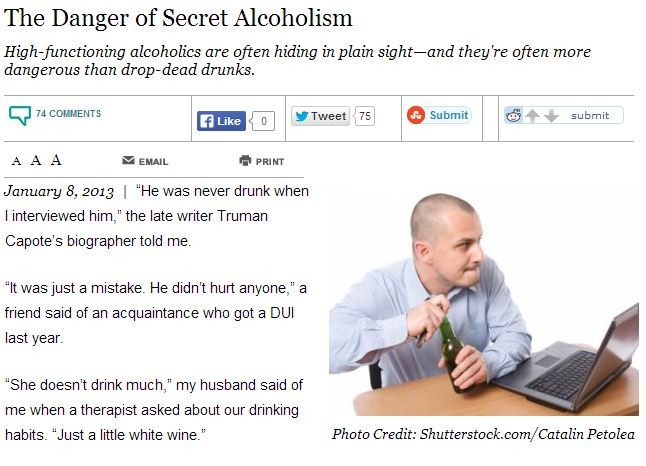When you hear the word “alcoholic,” what image comes to your mind? Like most people, you probably imagine a character like Ben Sanderson in Leaving Las Vegas, all disheveled and packing liquor bottles into a suitcase.
However, experts say that about half of all alcohol-dependent people are “high functioning.” That is, they seem to have their lives under control despite their addiction to the bottle. In fact, many of them have families and successful careers as doctors, lawyers, professors, and even journalists. Susan Cheever, writing for AlterNet.org, writes about her experience as an “invisible alcoholic”:
“I was one of those confusing invisible alcoholics. I didn’t stumble or slur. I didn’t break out in handcuffs. No one ever told me to stop drinking. There were no emergency rooms or rehabs. Most of the day, I considered myself sober. From the outside all was well: I had a loving husband, two terrific kids and an enviable career. From the inside I was hollowed out by despair. I got through the mornings on coffee and sugar, promising myself that I wouldn’t drink again. In this twilight state I lived my life—driving cars, arguing with the IRS, complaining about my marriage. By evening there only seemed one solution to the unbearable hammering of the hours—a glass of white wine, and then another.”
That being said, alcohol addiction, like all diseases, have tell-tale signs—but only if you’re aware of them. The Midwest Institute for Addiction, which provides outpatient rehab to St Louis patients, says the following symptoms may indicate that a loved one may be suffering from alcohol dependence:
Hiding the Habit
Do you find alcohol stashed in seemingly random places around the house? Most functioning alcoholics hide the habit from their loved ones out of fear and shame, so treat this a serious red flag.
Drink as Drug
A drink every now and then is not a bad thing, per se. However, when a person uses alcohol to self-medicate—to drink away the pain, so to speak—there might be a more serious problem at hand. If your friend or relative would much rather nurse a bottle than discuss their struggles with you, it’s time to be concerned.
Leading a Double Life
A functional alcoholic may seem to have the perfect life, but beneath that veneer is an uncontrollable desire to drink. Oftentimes, “rock-bottom” moments, like a divorce or a drunk-driving arrest, reveal the double life they’ve been leading.
If someone you know exhibits these symptoms, consult with practices that specialize in substance abuse treatment, such as St Louis rehab facilities. With their help, patients can effectively control the craving, allowing them to truly take control of their lives.
(Source: The Danger of Secret Alcoholism, AlterNet.org, January 8, 2013)











